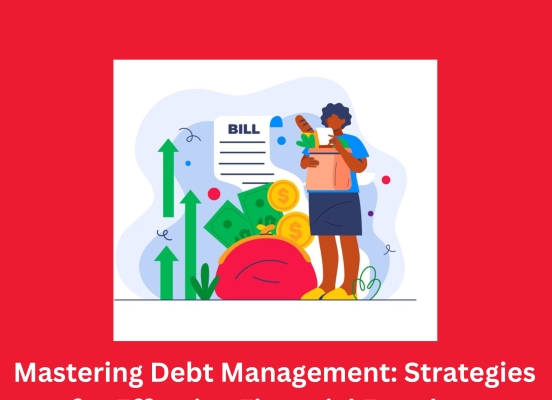
Mastering Debt Management: Strategies for Effective Financial Freedom
- By admin --
- Thursday, 14 Mar, 2024
Introduction:
Managing debt effectively is a critical aspect of personal finance that plays a significant role in achieving financial stability and freedom. Debt, when utilized wisely, can be a tool for building wealth and achieving financial goals. However, excessive debt can lead to financial stress, hinder progress towards long-term objectives, and impede financial well-being. In this comprehensive guide, we will explore strategies for managing debt effectively, empowering individuals to take control of their finances and work towards a debt-free future.
Understanding Debt:
Debt refers to money borrowed by individuals or entities to finance expenses or investments. Common types of debt include credit card debt, student loans, mortgages, auto loans, personal loans, and medical bills. Effective debt management involves understanding the various types of debt, their terms, interest rates, and repayment options.
-
Assessing Debt:
- Start by compiling a list of all outstanding debts, including the principal amount owed, interest rates, minimum monthly payments, and due dates.
- Categorize debts based on their type, interest rates, and priority for repayment.
- Calculate the total amount of debt outstanding and determine your debt-to-income ratio to assess your overall financial situation.
-
Creating a Repayment Plan:
- Prioritize High-Interest Debt: Focus on paying off high-interest debts first, such as credit card debt, to minimize interest costs and accelerate debt repayment.
- Snowball Method: Start by paying off the smallest debt balance while making minimum payments on other debts. Once the smallest debt is paid off, apply the freed-up funds towards the next smallest debt, creating a snowball effect.
- Avalanche Method: Prioritize debts with the highest interest rates first, directing extra payments towards these debts while making minimum payments on others. This approach minimizes interest costs over time.
-
Budgeting for Debt Repayment:
- Allocate a portion of your income towards debt repayment in your monthly budget.
- Cut Expenses: Identify areas where you can reduce discretionary spending and reallocate funds towards debt repayment.
- Increase Income: Explore opportunities to boost your income through side hustles, freelance work, or seeking a higher-paying job to accelerate debt repayment.
-
Negotiating with Creditors:
- Contact creditors to explore options for reducing interest rates, extending repayment terms, or negotiating settlements for outstanding debts.
- Consider debt consolidation or refinancing options to streamline multiple debts into a single loan with a lower interest rate, reducing overall interest costs and simplifying repayment.
-
Avoiding Future Debt:
- Develop Healthy Financial Habits: Establish a budget, live within your means, and avoid overspending to prevent accumulating new debt.
- Build an Emergency Fund: Save for unexpected expenses and emergencies to avoid relying on credit cards or loans in times of financial need.
- Use Credit Responsibly: Limit the use of credit cards and only borrow what you can afford to repay to avoid falling into a cycle of debt.
-
Seeking Professional Help:
- Consult with a certified financial planner or credit counselor for personalized advice and guidance on debt management strategies.
- Consider debt management programs or debt settlement services, but research thoroughly and beware of scams or predatory practices.
Conclusion:
Managing debt effectively is essential for achieving financial freedom and peace of mind. By assessing your debt, creating a repayment plan, budgeting for debt repayment, negotiating with creditors, avoiding future debt, and seeking professional help when needed, you can take control of your finances and work towards a debt-free future. Remember that debt management requires discipline, patience, and commitment, but the rewards of financial freedom and security make the effort worthwhile. With the right strategies and mindset, you can overcome debt challenges and build a solid foundation for a brighter financial future.





